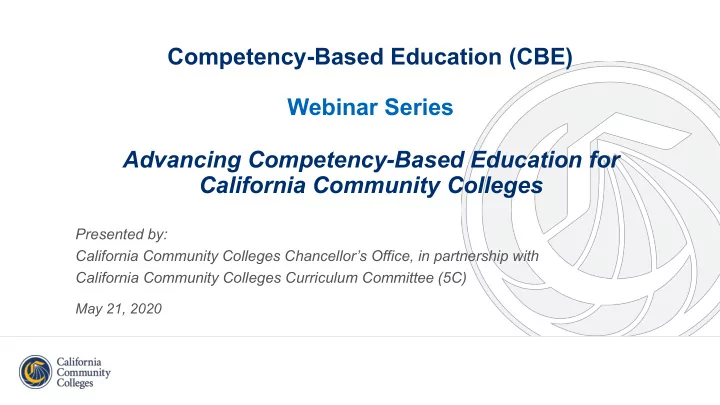

Competency-Based Education (CBE) Webinar Series Advancing Competency-Based Education for California Community Colleges Presented by: California Community Colleges Chancellor’s Office, in partnership with California Community Colleges Curriculum Committee (5C) May 21, 2020
Webinar Logistics Click the Closed Caption (CC) tab to read live captions Click the Question & Answer (Q&A) tab to enter questions for the presenters and to read their responses
Panelists Marty Alvarado – CCCCO Executive Vice Chancellor, Educational Services and Support Aisha Lowe – CCCCO Vice Chancellor, Educational Services and Support Cheryl Aschenbach – 5C Co-Chair, ASCCC Secretary, Lassen Community College Faculty Karen Daar – 5C Co-Chair, LA Valley College VP AcademicAffairs Jan Young – 5C ACCE Representative, Glendale College Division Chair of Continuing Education
Overview • • • •
• For-credit CBE programs are a needed addition to our instructional portfolio • CBE will help us meet our goals (Vision for Success) • CBE is an economic mobility lever • Career preparation is essential to the future of our state and our system • CBE can flex with changing technologies, employer demands, and unexpected societal shifts
• We have made substantial progress toward our goals, but gaps remain • Noncredit serves a high number of students that are disproportionately impacted (DI) • CBE for-credit opportunities will enhance student outcomes • Giving students access to significant wage gains with a degree
CBE Focuses on Mastery of Competencies Credit Hour Model … Competency Based Education … moves beyond based on seat time seat-time focusing on mastery of originally designed to competencies , through learning determine faculty pensions activities and experiences that and not as a measure of align with clearly defined learning. programmatic outcomes. Credit Hour is current basis Hours will vary, but the learning for awarding financial aid, is fixed . faculty workload & degree completion. Often fully online modules. Flexible academic calendar term options.
Competency-based education is and is not…. CBE is… CBE is not… Time is variable with program offered in a Learner works at course-set pace with pre- flexible, self-paced approach determined schedule of assignments, activities, etc. with true beginning and end dates Learning is fixed requiring demonstration of Learning varies with passing course grade mastery of each competency (i.e., A, B, C, D) Determined by rigorous summative authentic Student evaluation varies based on accumulation assessment focused on meeting core outcomes of activities, exams, projects, discussion, and competencies attendance, etc. Student learning supported by faculty and staff Independent study (i.e., students learn on their throughout learning journey own and then take final exam) Completion of program is based on mastery of Achievement of credential is based on passing intentionally designed scaffold of all grades and credit-hours (i.e., 60 credit competencies hours=AA/AS)
• • • • • •
• • • • • • • •
• •
Noncredit Certificates vs. Direct Assessment CBE Degrees
• California Community Colleges Chancellor’s Office Staff • California Community Colleges Curriculum Committee (5C) Co- chairs and Representatives • Foundation for California Community Colleges Policy Center Staff • Jobs for the Future Consultants • Content Experts • Lori Dodge, Vice Chancellor of Institutional Assessment and Planning, Brandman University (CBE expert) • Eddie Comeaux, Associate Professor of Higher Education, UCR (Culturally Sensitive Pedagogy and Equity Expert)
• • • • •
• Objective : Engage the 5C in deep learning around competency-based education for the purpose of identifying regulatory barriers to direct assessment competency-based education. • Outcome : T o create a package of regulatory language for statewide implementation of direct assessment CBE and identify the next steps necessary to successfully pilot direct assessment CBE programs in the CCC system. • Process : 5C engages in monthly conversations around CBE having the necessary discussions to develop policy.
Date Discussion January 2020 • Competency-based education overview and definition February 2020 • CBE Program Design • Overview of CBE Program • Introduction to Backwards Design April 2020 • Program Quality Standards and Approval • Academic Standards and Course Approval • Related Course Elements - Credit Hour - Academic Symbols and Grade Point Average - Types of Courses Appropriate for Associate’s Degrees May 2020 • Consider a full CBE program model • Policy and Guidance Focus Areas - Faculty Role - Academic Calendar - Withdrawal - Repetition June • Implementation • Governance and approval processes • Regional accrediting processes • Evaluation
• • • • • •
• • • • • •
On the Horizon
Competency-Based Education Webinar Series Competency-Based Education: WEBINAR I What is it and how is it different from our current offerings? 05.14.20 | 2:30–3:30 p.m. Watch the recording WEBINAR II Advancing Competency-Based Education for 05.21.20 | 2:30-3:30 p.m. California Community Colleges WEBINAR III Competency-Based Education: Getting Involved TBA (June 2020) The Pilot
Questions?
Thank you!
Recommend
More recommend